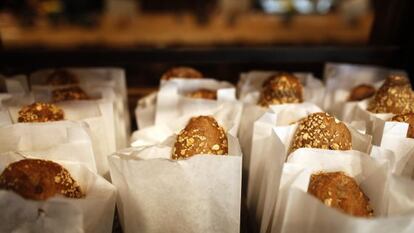Argentina cuts wheat exports to stop the price of bread rising
The government of Cristina Fernández de Kirchner has decided to dust off a special Supply Law

The country that was known as the world’s breadbasket in the early 20th century, the same nation that sent cereal to Spain under the government of Juan Domingo Perón (1946-1954) to fill Spaniards’ bellies during the postwar years; this very same land is now facing a wheat shortage. Argentina, where pasta, pizza, baked goods and white bread are a staple of people’s diet, has experienced a 50-percent rise in the price of this latter product in the first half of 2013. The pace more than doubles annual inflation, and the government of Cristina Fernández de Kirchner has decided to dust off a special Supply Law to halt wheat exports and force growers and exporters to sell their stock domestically.
Following the move, wheat fetched 25 percent less on the cereals exchange than a week earlier. This drop should start to be felt in the wholesale price of flour, which had tripled in the first half of the year. And this, in turn, should bring down the price of bread, which was selling for 2.94 to 4.41 dollars a kilogram in recent weeks, depending on the area of Argentina. Since late June, the government has been negotiating with millers and bakers to bring the kilo of bread down to 1.84 dollars, but it was only last Thursday that the results of these talks began to be felt in some supermarkets and grocery stores.
“Do you have bread for 10 pesos?” The question, asked in a bakery in Almagro, a middle- class neighborhood in Buenos Aires, received the following reply: “You’re going to have a hard time finding it until flour goes down.” At this particular establishment, called Santa Rosa, bread was being sold for 3.68 dollars a kilo. But in other parts of the capital it was available for half the price.
The president of the Industrial Bread Federation of Buenos Aires Province, Emilio Majori, said that bakeries were “gradually” adopting the new prices, and that the cheap bread will only be available in limited supplies equivalent to 10 percent of the total offer. Meanwhile, the head of the aristocratic Sociedad Rural, Luis Etchevehere, said that bread at the official price of 1.84 dollars the kilo is just “a ghost” and asked the government to lift the freeze on exports.
Tariffs on farm exports became widespread in 2002, when the peso devaluated sharply
But Majori blamed growers for speculating with wheat and congratulated the government for threatening to use the Supply Law, which punishes those who hoard a product at times of shortage.
Tariffs on farm exports became widespread in 2002, when the peso devaluated sharply, favoring exports. These export fees reduce the value of the product on the domestic market. Since 2006, successive Kirchner-oriented governments have capped the amount of wheat that may be exported to ensure a local supply at lower prices. Since then, the annual harvest has dropped from 15 million tons to nine million, the lowest amount recorded in the country since 1899. Many growers have switched to soy, the country’s main export crop, which has to pay even higher export fees but has no quotas and fetches higher prices on the international markets (especially China and Europe, where soy flour is used to feed livestock). Another popular option is barley, which faces fewer tariffs and no export restrictions.
Last week, the government of Fernández de Kirchner also recommended that people stop consuming tomatoes for a couple of months, because this product is also getting hard to find and prices are skyrocketing. So from now on, the already expensive pizza and pasta dishes may have to do without the tomato sauce.
Tu suscripción se está usando en otro dispositivo
¿Quieres añadir otro usuario a tu suscripción?
Si continúas leyendo en este dispositivo, no se podrá leer en el otro.
FlechaTu suscripción se está usando en otro dispositivo y solo puedes acceder a EL PAÍS desde un dispositivo a la vez.
Si quieres compartir tu cuenta, cambia tu suscripción a la modalidad Premium, así podrás añadir otro usuario. Cada uno accederá con su propia cuenta de email, lo que os permitirá personalizar vuestra experiencia en EL PAÍS.
¿Tienes una suscripción de empresa? Accede aquí para contratar más cuentas.
En el caso de no saber quién está usando tu cuenta, te recomendamos cambiar tu contraseña aquí.
Si decides continuar compartiendo tu cuenta, este mensaje se mostrará en tu dispositivo y en el de la otra persona que está usando tu cuenta de forma indefinida, afectando a tu experiencia de lectura. Puedes consultar aquí los términos y condiciones de la suscripción digital.









































